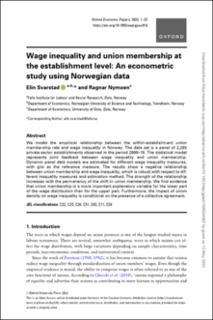Wage inequality and union membership at the establishment level: An econometric study using Norwegian data
Journal article, Peer reviewed
Published version
Permanent lenke
https://hdl.handle.net/11250/3035512Utgivelsesdato
2022Metadata
Vis full innførselSamlinger
- Institutt for samfunnsøkonomi [1159]
- Publikasjoner fra CRIStin - NTNU [38127]
Originalversjon
10.1093/oep/gpac018Sammendrag
We model the empirical relationship between the within-establishment union membership rate and wage inequality in Norway. The data set is a panel of 2,285 private-sector establishments observed in the period 2000–18. The statistical model represents joint feedback between wage inequality and union membership. Dynamic panel data models are estimated for different wage inequality measures, with gini as the reference measure. The results show a negative relationship between union membership and wage inequality, which is robust with respect to different inequality measures and estimation method. The strength of the relationship increases with the permanency of the shift in union membership. We find evidence that union membership is a more important explanatory variable for the lower part of the wage distribution than for the upper part. Furthermore, the impact of union density on wage inequality is conditional on the presence of a collective agreement. Wage inequality and union membership at the establishment level: An econometric study using Norwegian data

